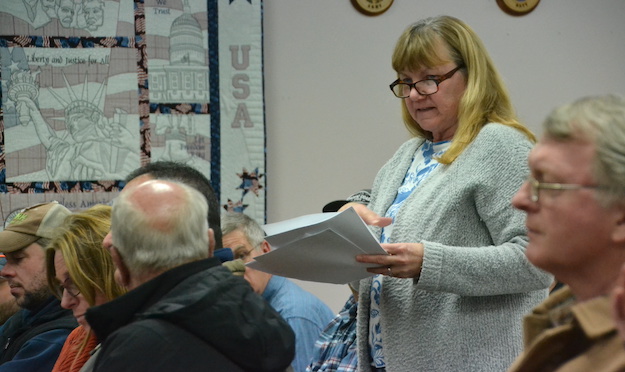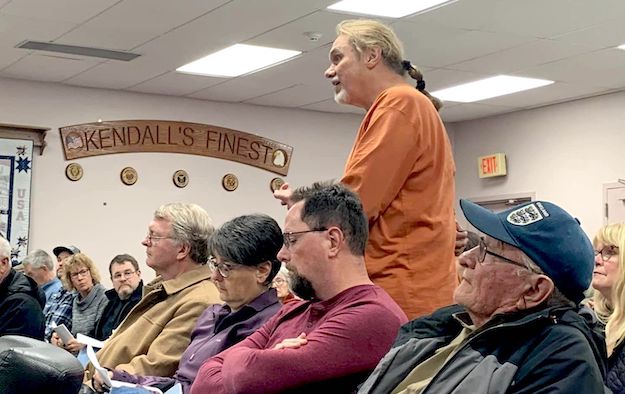Kendall Town Board passes law regulating short-term rentals
Many STR owners vow to sue, calling law ‘discriminatory’

Photos by Tom Rivers: June Chippendale of Kendall asks the Town Board not to pass a law putting regulations on short-term rentals. She is looking to operate an STR in the future.
KENDALL – The Town Board on Tuesday night passed a law regulating short-term rental properties in the town, an action that some of the STR owners said was “discriminatory” and would result in a lawsuit against Kendall.
The new law also bans any new short-term rentals in the waterfront districts, excluding bed and breakfasts which require a separate special use permit. Existing STRs shall be grandfathered in and allowed to continue.
The Town Board said the waterfront districts have houses closer together on private one-lane roads. The STRs are presenting “parking and traffic impacts,” town officials write in the new law.
The board and community have been debating short-term rentals for several months. Town Board members said there have been complaints in recent years with the rise of short-term rentals, such as Airbnbs and Vrbo.
Some of the neighbors of STRs have complained that some of the STRs are loud, especially at night when the homeowners want peace and quiet after working in the city. Some neighbors said those businesses shouldn’t be allowed on one-lane private roads, and STRs also can drive up neighbors’ property insurance costs.
STR owners who spoke at Tuesday’s meetings said the community has a long history of renting out cottages to visitors. The STRs are nothing new, but have become more popular during the Covid pandemic with people seeking a getaway after being confined to their own homes.
Greg Stuckless of Norway Heights said the income from an STR was essential in allowing his family to put in a breakwall to protection from erosion during the flooding in 2017 and 2019. During an economic downturn the STR revenue helped Stuckless keep up with his bills.
“It’s saved me,” he told the Town Board. “We would have lost our house.”

Greg Stuckless said operating a short-term rental gave his family needed funds, allowing them to keep their home.
Stuckless said the fees in the law are not unreasonable but he said he is concerned about the town increasing the STR owners’ liability for having guests on site and in the community.
The Town Board modified the law after a public hearing last month. An annual licensing fee with the town for an STR will be $250 (or $500 over 2 years), which was lowered from the $1,000 annually in the proposed law. Kendall will require a $1 million liability insurance for STR owners, rather than the $3 million in the draft law.
The town had proposed STR owners would lose their permit to operate if they haven’t had any STR business over six months. That has been changed to one year.
The board passed the new law in a 4-0 vote with yes votes from Town Supervisor Tony Cammarata, and board members Barb Flow, Margaret Lynn Szozda and Paul Jennings.
Rich Miller, a resident of Lakeland Beach Road and a real estate agent, said the town’s new law is “ill advised” and an attack on property rights.
He told the board to expect a lawsuit. About 20 of the rental owners have joined together to hire an attorney to oppose the regulations. They are represented by attorney Steven Barshov of Sive, Paget & Riesel in New York City.
One resident said the STRs are better maintained than most of the properties in the town, with the buildings, lawns and vehicle upkeep. The board should be looking at all properties and not just focusing on STRs, the resident said.
Ken DeRoller, a former county legislator, said Kendall should coordinate its law with the towns of Carlton and Yates as part of a Kendall-Yates-Carlton local waterfront development plan. That LWRP aims for consistency with town regulations along about 25 miles of shoreline. DeRoller urged Kendall to “slow it down” in adopting the regulations.
The town’s property maintenance codes already address issues with poorly maintained structures and don’t require the regulations for STRs, attorney Barshov wrote to the town last month.
Barshov questioned parts of the regulations that limit two people per sleeping room, sprinkler systems above the second floor of buildings used as STRs, and a ban on parking recreational vehicles, campers, trailers or motor vehicles larger than a 1-ton pickup truck.
“The character of a neighborhood is not destroyed by occupants of short-term rental properties doing exactly what residential property can do,” Barshov wrote.
The attorney said the Town Board has misstated the issues with STRs, portraying an “STR war zone” that doesn’t exist. There are only a few isolated incidents and none are “malicious,” he said.
“There are no reports of rampant misbehavior or anything like it at STR properties,” he wrote.







































































